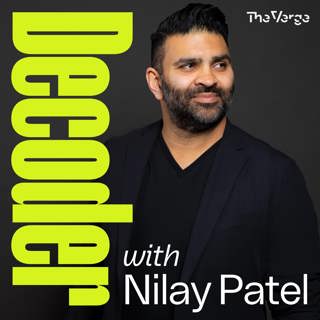
Gary Vaynerchuk is ‘petrified’ of Slack
If you’ve spent more than two minutes somewhere on social media, you have probably come across Gary Vaynerchuk. For years I have wondered, is this just a character? Or is there a real Gary Vaynerchuk somewhere behind “GaryVee,” the social media entrepreneur and internet brand? Gary got his start working at his family’s liquor store, which he turned into an online wine shop. That’s where he started in social media, hosting a long-running YouTube show called “Wine Library TV.” He parlayed that into the gigantic GaryVee brand, which at its core, is about entrepreneurship. Gary co-founded the restaurant reservation platform Resy, which he sold to American Express in 2019, and Empathy Wines which he sold in 2020. The Vaynerchuk empire remains vast, and it’s structured in complicated ways. There’s holding company VaynerX, which contains the ad agency VaynerMedia. There’s another company called Gallery Media which owns lifestyle websites. Gary even co-founded a sports agency – VaynerSports, with pro athletes like the NFL’s Kirk Cousins and Sauce Gardner on the roster, MLB shortstop Bo Bichette, and a variety of combat athletes. On top of all that, there’s a serious upheaval going on in digital media. The era of the social web is coming to a major moment of change, with new platforms like TikTok in the mix and old standbys like Twitter and Reddit going through complicated and controversial resets. New platforms bring new personalities and influencers, who are native to those platforms and maybe better at capturing the audience there. It’s one thing when you’re the first GaryVee. But staying GaryVee, in a time of change, and pitching brands and companies that his approach to social media will stay relevant, is an ongoing challenge. We got to chat with Gary at his Hudson Yards office in Manhattan and I will tell you, he did not hold back with his answers. Links: A trip to the GaryVee convention, where everyone is part of crypto’s 1 percent - The Verge How Gary Vaynerchuk Became an NFT Guru Gary Vaynerchuk expects NFTs to expand beyond digital collectibles long term | TechCrunch Transcript: https://www.theverge.com/e/23530741 Credits: Decoder is a production of The Verge and part of the Vox Media Podcast Network. It was produced by Jackie McDermott and Raghu Manavalan. It was edited by Callie Wright. The Decoder music is by Breakmaster Cylinder. Our Editorial Director is Brooke Minters and our Executive Director is Eleanor Donovan. Learn more about your ad choices. Visit podcastchoices.com/adchoices
21 Juni 202350min

Private equity bought out your doctor and bankrupted Toys”R”Us. Here’s why that matters.
The idea behind private equity or PE is simple: a private equity firm gathers up a bunch of cash, raises some investor cash and takes on a lot of debt to buy various companies, often taking them off the public stock market. Then, they usually install new management and embark on aggressive cost cutting and turnaround programs – mostly because they have to pay down all that debt pretty fast. Then, the company can be sold or taken public again for a hefty profit. But don’t worry—if it doesn’t work out, the PE firms are extracting fees at every step of the process so they get paid no matter what happens. In another world, these PE deals are just boring financing strategies or maybe the backbone of the occasional juicy corporate takeover story. In Decoder world, PE is everywhere. Since the modern PE industry kicked off in the 1980’s, it’s grown virtually unchecked, and as author Brendan Ballou explains, that’s had seriously negative consequences for all kinds of markets and consumers. Private equity affects everything from the modern nursing home industry, to the Solarwinds hack, one of the biggest hacks in U.S. history. Brendan Ballou is the author of Plunder: Private Equity’s Plan to Pillage America. Brendan is also a federal prosecutor and he served as Special Counsel for Private Equity in the antitrust division at the Department of Justice, so he’s uniquely suited to writing a book like this. Although he will be the first to tell you, the book does not reflect the views of the DOJ. This is a wonky episode, but it’s essential. Links: Plunder by Brendan Ballou How Private Equity Buried Payless - The New York Times Barnes & Noble is going back to its indie roots to compete with Amazon - Decoder, The Verge How arson led to a culture reboot at Traeger, with CEO Jeremy Andrus - Decoder, The Verge Opinion | Private Equity Is Gutting America — and Getting Away With It - The New York Times Ticketmaster, Taylor Swift, and antitrust – explained - The Verge What is chokepoint capitalism, with authors Cory Doctorow and Rebecca Giblin Credits: Decoder is a production of The Verge, and part of the Vox Media Podcast Network. Today’s episode was produced by Jackie McDermott and Raghu Manavalan, and it was edited by Callie Wright. The Decoder music is by Breakmaster Cylinder. Our Editorial Director is Brooke Minters, and our Executive Producer is Eleanor Donovan. Learn more about your ad choices. Visit podcastchoices.com/adchoices
13 Juni 20231h

SiriusXM’s 360 strategy with CEO Jennifer Witz
Jennifer Witz is the CEO of SiriusXM. You probably know the company as the satellite radio brand in virtually every new car, but it also owns Pandora, a huge podcast network that includes Team Coco and 99% Invisible, a content operation with huge stars like Howard Stern, and has broadcast deals with every major sports league. SiriusXM is effectively the dominant market leader for built-in premium audio in cars, in a time when competition is increasing. As the infotainment system in cars gets ever more complex and computer-like, the Sirius experience has to keep up. On top of that, the state of car software is a mess. GM announced it won’t support Apple CarPlay in new EVs. Other companies are using various versions of Android. Tesla has its own platform. And Sirius has to support all of it with applications that compete with Big Tech companies, all while continuing to integrate the satellite hardware into the cars themselves — on top of launching satellites on SpaceX rockets. Links: After layoffs, SiriusXM looks to star-studded podcasts What Is SiriusXM with 360L? A Breakdown of the New Audio Platform SiriusXM CEO Calls Audio Ad Sales Market “Tough” Transcript: https://www.theverge.com/e/23514318 Credits: Decoder is a production of The Verge, and part of the Vox Media Podcast Network. Today’s episode was produced by Jackie McDermott and Raghu Manavalan, and it was edited by Callie Wright. The Decoder music is by Breakmaster Cylinder. Our Editorial Director is Brooke Minters, and our Executive Producer is Eleanor Donovan. Learn more about your ad choices. Visit podcastchoices.com/adchoices
6 Juni 20231h 5min

Microsoft CTO Kevin Scott on AI copilots, disagreeing with OpenAI, and Sydney making a comeback
Microsoft CTO Kevin Scott oversees the company's AI efforts, including its big partnership with OpenAI and ChatGPT. Kevin and I spoke ahead of his keynote talk at Microsoft Build, the company’s annual developer conference, where he showed off the company’s new AI assistant tools, which Microsoft calls Copilots. Microsoft is big into Copilots. GitHub Copilot is already helping millions of developers write code, and now, the company is adding Copilots to everything from Office to the Windows Terminal. Basically, if there’s a text box, Microsoft thinks AI can help you fill it out, and Microsoft has a long history of assistance like this. You might remember Clippy from the ’90s. Well, AI Super Clippy is here. Microsoft is building these Copilots in collaboration with OpenAI, and Kevin manages that partnership. I wanted to ask Kevin why Microsoft decided to partner with a startup instead of building the AI tech internally, where the two companies disagree, how they resolve any differences, and what Microsoft is choosing to build for itself instead of relying on OpenAI. Kevin controls the entire GPU budget at Microsoft. I wanted to know how he decides to spend it. We also talked about what happened when Bing tried to get New York Times columnist Kevin Roose to leave his wife. Like I said, this episode has a little bit of everything. Okay. Kevin Scott, CTO and executive vice president of AI at Microsoft. Here we go. Links: Microsoft Build - The Verge Kevin Scott on Vergecast in 2020 GitHub Copilot gets a new ChatGPT-like assistant to help developers write and fix code - The Verge Hackers made Iran's nuclear computers blast AC/DC - The Verge Microsoft resurrects Clippy again after brutally killing him off in Microsoft Teams - The Verge Google’s Sundar Pichai talks Search, AI, and dancing with Microsoft - The Verge Congress hates Big Tech — but it still seems optimistic about AI - The Verge Hollywood writers to strike over low wages caused by streaming boom. - The Verge The 70 percent solution — CNN Sal Khan: How AI could save (not destroy) education | TED Talk Why a Conversation With Bing’s Chatbot Left Me Deeply Unsettled - The New York Times Responsible AI principles from Microsoft Microsoft has been secretly testing its Bing chatbot ‘Sydney’ for years - The Verge Transcript: https://www.theverge.com/e/23497429 Credits: Decoder is a production of The Verge, and part of the Vox Media Podcast Network. Today’s episode was produced by Jackie McDermott and Raghu Manavalan, and it was edited by Callie Wright. The Decoder music is by Breakmaster Cylinder. Our Sr. Audio Director is Andrew Marino, our Editorial Director is Brooke Minters, and our Executive Producer is Eleanor Donovan. Learn more about your ad choices. Visit podcastchoices.com/adchoices
23 Maj 20231h 7min

Recode Media: Inside the AI Gold Rush
Today – we’ve got a treat for you. We’re going to run a special episode from our friends over at Vox. Peter Kafka and his team just wrapped up a special 3-part series on AI. AI has captured the imagination of Silicon Valley. In fact, in the last few months, I’ve talked to both Google CEO Sundar Pichai and Microsoft CEO Satya Nadella about AI after they announced new AI-powered search products. And in the middle of the frenzy, it's hard to tell what's really going on. What exactly is AI, how does tech plan to re-design the world with it, and why are a bunch of smart people very, very worried? In this episode, they’re diving into the gold rush around AI. Figuring out what’s just hype, meeting the VCs that are hungry to invest, and finding out if there will be room for startups, or if the giants will just own it all. If you’re a Decoder listener, this is right up your alley. Thanks to Peter Kafka and Vox. Learn more about your ad choices. Visit podcastchoices.com/adchoices
16 Maj 202350min

Exclusive: Google’s Sundar Pichai talks Search, AI, and dancing with Microsoft
Hello and welcome to Decoder. I’m Nilay Patel, editor in chief of The Verge, and Decoder is my show about big ideas, and other problems. We have a special episode today – I’m talking to Sundar Pichai, the CEO of Google and Alphabet. We hung out the day after Google IO, the company’s big developer conference, where Sundar introduced new generative AI features in virtually all of the company’s products. It’s an important moment for Google, which invented a lot of the core technology behind the current AI moment – the company is quick to point out the T in chatGPT stands for Transformer, the large language model tech first which was invented at Google. But openAI and others have been first to market with generative AI products — and openAI in particular has partnered with Microsoft on a new version of Bing that feels like the first real competitor to Google search in a long time. So I wanted to know what Sundar thinks of this moment – and in particular, what he thinks of the future of search, which is the heart of Google’s business. Web search right now can be pretty hit or miss, right? There’s a lot of weird content farms out there, and AI-based search might be able to just answer questions in a more natural way. But that means remaking the web, and really, remaking Google. Sundar is already going down that path – he just reorganized Google and Alphabet’s AI teams, moving a company called DeepMind inside Google and merging it with the Google Brain AI group to form a new unit called Google DeepMind. I can’t resist an org chart question, so we talked about why he made that call – and how he made it. We also talked about Sundar’s vision for Google – where he wants it to go, and what’s driving his ambition to take the company into the future. This is a jam-packed episode – we talked about a lot, and I didn’t even get to Google’s AI metadata plans, or what’s going on with RCS and Android. Maybe next time. Links: The nine biggest announcements from Google I/O 2023 What happens when Google Search doesn't have the answers? Microsoft thinks AI can beat Google at search — CEO Satya Nadella explains why Let’s chat about RCS - The Verge Transcript: https://www.theverge.com/e/23484772 Learn more about your ad choices. Visit podcastchoices.com/adchoices
12 Maj 202342min

I can't make products just for 41 year old tech founders," Airbnb CEO Brian Chesky on taking it back to the basics
Brian Chesky, the co-founder and CEO of Airbnb, was previously on the show in 2021. Back then, Airbnb was betting big on long-term stays for remote work amid the pandemic, and Chesky had just restructured the company to a more functional organization, getting rid of the divisions it had before. Now, the pandemic is ending, Airbnb has itself adopted a hybrid policy, Chesky’s back in the office several days a week, and they’re two years into that new structure. So that’s pure Decoder bait. I wanted to ask Chesky how that restructure is going. Has it really made the company more agile and cohesive like he hoped? Has the bet on working from anywhere paid off? Links: Brian Chesky's tweet announcing the summer 2023 launch Microsoft thinks AI can beat Google at search — CEO Satya Nadella explains why Samsung caught faking zoom photos of the Moon Why the future of work is the future of travel, with Airbnb CEO Brian Chesky Credits: Decoder is a production of The Verge, and part of the Vox Media Podcast Network. Today’s episode was produced by Creighton DeSimone and Jackie McDermott and it was edited by Callie Wright. The Decoder music is by Breakmaster Cylinder. Our Sr Audio Director is Andrew Marino and our Executive Producer is Eleanor Donovan. Learn more about your ad choices. Visit podcastchoices.com/adchoices
9 Maj 20231h 4min

The social media age for news is over. Former BuzzFeed News editor Ben Smith on what’s next
Ben Smith is the former and founding editor-in-chief of Buzzfeed News, the founder and editor-in-chief of Semafor, and the author of a new book called Traffic: Genius, Rivalry, and Delusion in the Billion-Dollar Race to Go Viral, which is about the rise and fall of the social platform age in media, through the lens of Gawker Media and Buzzfeed and, in particular, their founders, Nick Denton and Jonah Peretti. I say the fall of the social platform age pretty literally: just before we spoke, Buzzfeed actually shut down Buzzfeed News, saying it just wasn’t making enough money, Facebook and the rest are all in on vertical video, and the chaos at Twitter means a lot of baseline media industry assumptions are now up for grabs. Ben and I talked about a lot – where do journalists build their brands now? Where does traffic even come from anymore? What’s next? Of course, we talked about Semafor as well. Ben and his co-founder, Justin Smith, raised $25 million and launched a news website, newsletters, and events covering the US and sub-Saharan Africa, with plans to expand into other regions. I wanted to know what lessons from Buzzfeed Ben brought into Semafor and, honestly, how he’s thinking about building an audience instead of just trying to get traffic. This is a good one. The book’s great, too. Transcript: https://www.theverge.com/e/23470662 Links: Traffic by Ben Smith What Colors Are This Dress? TikTok - The Verge Is Substack Notes a ‘Twitter clone’? We asked CEO Chris Best - The Verge MyPillow CEO’s free speech social network will ban posts that take the Lord’s name in vain - The Verge Former Facebook Workers: We Routinely Suppressed Conservative News Cambridge Analytica: understanding Facebook’s data privacy scandal - The Verge 28 Signs You Were Raised By Persian Parents In America Here's The Powerful Letter The Stanford Victim Read To Her Attacker More Than 180 Women Have Reported Sexual Assaults At Massage Envy Macedonia’s Pro-Trump Fake News Industry Had American Links, And Is Under Investigation For Possible Russia Ties Watching Silicon Valley Bank melt down from the front row, with Brex CEO Henrique Dubugras - Decoder, The Verge Credits: Decoder is a production of The Verge and part of the Vox Media Podcast Network. It was produced by Creighton DeSimone and Jackie McDermott with help from Hadley Robinson and it was edited by Callie Wright. The Decoder music is by Breakmaster Cylinder. Our Editorial Director is Brooke Minters and our Executive Director is Eleanor Donovan. Learn more about your ad choices. Visit podcastchoices.com/adchoices
2 Maj 20231h 11min






















